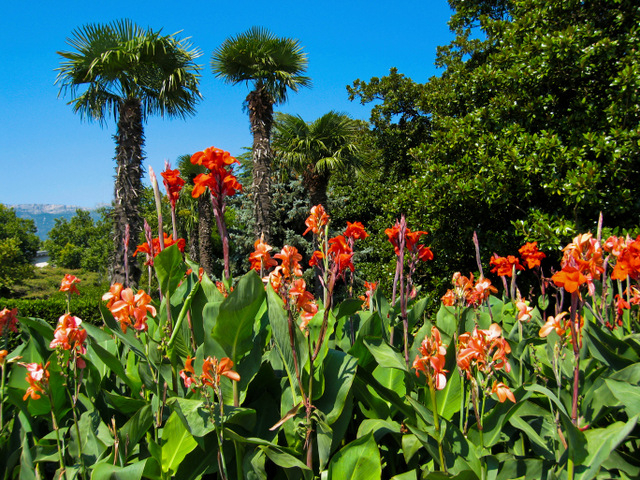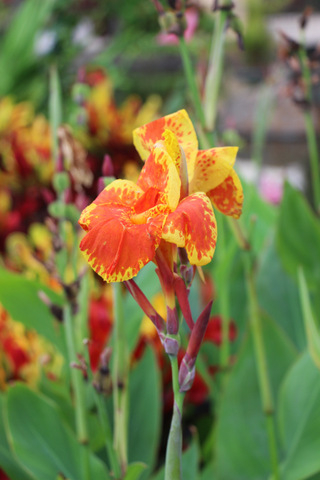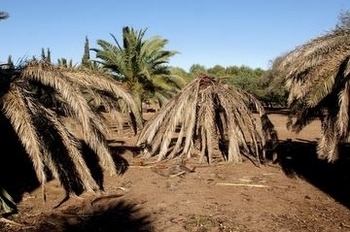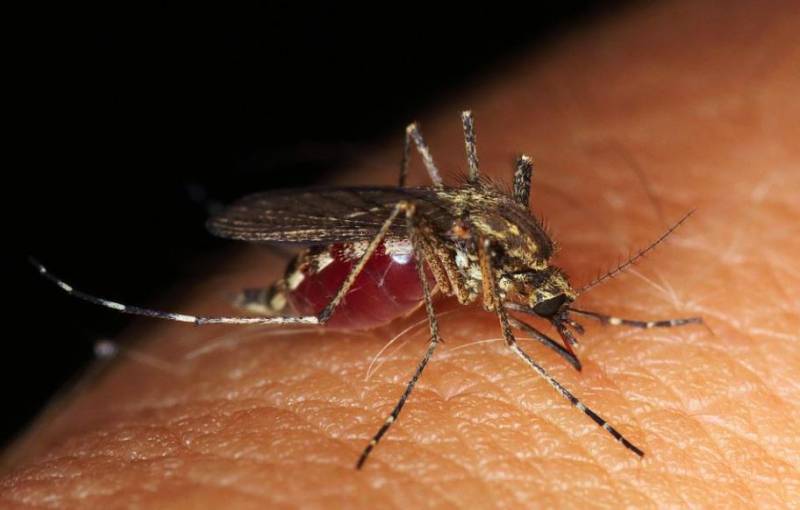- Region
- Vega baja
- Marina Alta
- Marina Baixa
- Alicante
- Baix Vinalopo
- Alto & Mitja Vinalopo
-
ALL TOWNS
- ALICANTE TOWNS
- Albatera
- Alfaz Del Pi
- Alicante City
- Alcoy
- Almoradi
- Benitatxell
- Bigastro
- Benferri
- Benidorm
- Calosa de Segura
- Calpe
- Catral
- Costa Blanca
- Cox
- Daya Vieja
- Denia
- Elche
- Elda
- Granja de Rocamora
- Guardamar del Segura
- Jacarilla
- Los Montesinos
- Orihuela
- Pedreguer
- Pilar de Horadada
- Playa Flamenca
- Quesada
- Rafal
- Redovan
- Rojales
- San Isidro
- Torrevieja
- Comunidad Valenciana
Dividing and clearing canna plants
Cannas grow well in sun or shade and spread rapidly
Dividing Cannas.
Cannas are a welcome addition to many Spanish gardens as the range of stunning foliages and vibrant flowers give a real tropical feel to any patio or courtyard garden, yet the plants require surprisingly little maintenance to put on a striking show year after year.They do, however, like a boit of water, so don´t try and grow them if you have a very dry garden in full full Mediterranean sun.
The foliages range from deepest chocolatey reds to zingy lime greens, and planted in blocks they are the plant of choice for many municipal planting schemes and roundabouts.

They spread quickly and enthusiastically, and can easily triple in size during a summer growing season, so cutting them back stimulates fresh new flowering growth and provides mountains of material for creating new clumps in different locations or sharing with friends.
Cannas grow from what is known as a rhizome, best described as being like a big fat battery storage pack for energy which spreads through the ground storing food for the plant and supporting the heavy growth on top.
The propagation of cannas simply involves digging up the existing clump and breaking it into smaller pieces, each of which becomes a new plant.
To begin, cut back old foliage and clear away to leave a stump like structure, then cover pathways with a  piece of cardboard or plastic to minimise the mess made when digging. Using a fork, dig out the whole clump, taking care not to damage the rhizome, and transfer onto the cardboard so you can clearly see what needs to be done to the clump.
piece of cardboard or plastic to minimise the mess made when digging. Using a fork, dig out the whole clump, taking care not to damage the rhizome, and transfer onto the cardboard so you can clearly see what needs to be done to the clump.
It’s quite common for cannas to have rampaged off into neighbouring flowerbeds or onto garden paths, so make sure all the bits are dug out and don’t worry if they break; it’s quite normal.
Shake the roots free of soil and break the clumps into manageable pieces by hand, making sure each piece has a reasonable root system and a prominent “eye” which is the sign of new growth. You’ll see what I mean when you look at the pieces.
Using a sharp, clean knife, cut off any exhausted pieces of old rhizome and tidy up the clump before replanting with the rhizome level in the soil and the upper surface exposed to the sun. Firm up and water in.
If you have a powder fungicide, dust the broken areas to prevent rotting, but you’ll find there is lower risk of that occurring here in Spain than in the UK, due to the climatic difference.
To cover a large area, don’t plant enormous pieces as the plant will benefit from having space to grow, so make smaller clumps and spread them around, they’ll grow at an astonishing rate. Even small pieces will produce a new plant providing they have some roots.
We tend to divide during the spring in southern Spain and as our own area is frost-free, don´t lift, just take off the watering system after flowering: In other areas its advisable to lift if subject to frost as you would back in the UK.
Water sparingly during the winter, and be generous with a good fertiliser once the growing season starts in earnest.
Cannas are also fabulous pot plants, but give them a decent size of pot and lots of space in which to grow for best results. Make sure theyre well-drained, lift the pot off a saucers so they don´t get waterlogged as they can rot and make sure the soil used is a balanced mix: don´t use campo soil as it dries into a solid block, so mix with compost, a spot of sand a handful of well rotted organic compost or manure.



















































